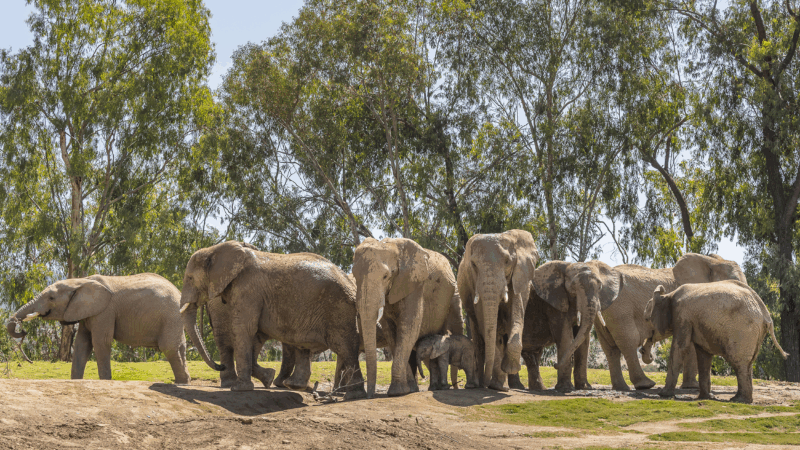When an earthquake struck San Diego, these elephants formed an ‘alert circle’
When a 5.2 magnitude earthquake hit Southern California on Monday, humans followed the usual drill: drop, cover and hold on.
But one herd of elephants at the San Diego Zoo Safari Park in Escondido, Calif. had their own plan — circle up and stand together.
Security footage from the park shows the moment clearly. One minute the elephants were basking in the sun; the next, they were reacting as the ground began to shake.
The three adult females scanned their surroundings and quickly banded together, forming a tight circle around two 7-year-old calves named Zuli and Mkhaya, according to the San Diego Zoo Wildlife Alliance.
Experts call this behavior an “alert circle,” a response matriarch elephants display when they perceive a threat.
“Elephants are highly social, they take care of each other,” says Joshua Plotnik, an associate professor of psychology at Hunter College in New York who studies elephant behavior.
Plotnik says this instinct to protect one another is at the core of the alert circle, a strategy for banding together when danger is near.
“They bunch together, the adults on the outside facing out, and then they’ll push the younger individuals into the middle,” he says.
Elephants can sense seismic vibrations through their feet and ears, Plotnik says, alerting them to potential danger. And earthquakes aren’t the only thing they can detect: Something similar happened during the 2006 Boxing Day Tsunami in southeast Asia, he recalls.
“I’ve heard anecdotes … of elephants responding prior to the large tsunami waves reaching the shores of Thailand, for instance, of elephants retreating up to higher ground with other elephants.”
These fast, coordinated responses reveal the complex social nature of elephants, Plotnik says. But he warns that elephants’ survival in today’s world requires more than just instinct; there’s still much we don’t understand about how they interpret threats.
Learning more, he says, is key to protecting these endangered animals.
“The Asian and African elephants are in imminent danger of going extinct, and it’s crucially important that we continue to learn more about their behavior and cognition if we’re going to come up with ways to protect them and conserve them in the wild,” Plotnik says.
High-speed trains collide after one derails in southern Spain, killing at least 21
The crash happened in Spain's Andalusia province. Officials fear the death toll may rise.
United Nations leaders bemoan global turmoil as the General Assembly turns 80
On Saturday, the UNGA celebrated its 80th birthday in London. Speakers including U.N. Secretary-General António Guterres addressed global uncertainty during the second term of President Trump.
Parts of Florida receive rare snowfall as freezing temperatures linger
Snow has fallen in Florida for the second year in a row.
European leaders warn Trump’s Greenland tariffs threaten ‘dangerous downward spiral’
In a joint statement, leaders of eight countries said they stand in "full solidarity" with Denmark and Greenland. Denmark's Prime Minister Mette Frederiksen added: "Europe will not be blackmailed."
Syrian government announces a ceasefire with the Kurdish-led Syrian Democratic Forces
Syria's new leaders, since toppling Bashar Assad in December 2024, have struggled to assert their full authority over the war-torn country.
U.S. military troops on standby for possible deployment to Minnesota
The move comes after President Trump again threatened to invoke the Insurrection Act to control ongoing protests over the immigration enforcement surge in Minneapolis.







